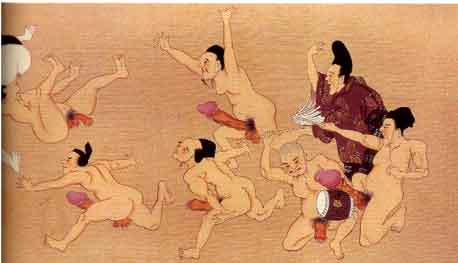Energy is eternal delight.” – William Blake[1]
Being gay is linked with laughter, etymologically and ontologically. Gay, from the Old French gai, means we are full of merriment, bright in appearance, and loose in our ways of living. Today homosexuals are frequently the butt of jokes. Indeed, real humour is rarely required of comedians, as the mere existence of an effeminate man or butch woman is enough to incite riotous laughter from the audience.

Japan, Phallic Contest, Shunga scroll
Contemporary culture has commodified pleasure-seeking. Fun is severed from its spiritual and social meanings. Introspection and independent action are less possible when people stop laughing at themselves. In this culture, homosexuals stand as contemporary Tricksters, Clowns, and Fools – the gender-bending, laughter-provoking, life-transforming archetype found in every culture around the world. When we are called fools, let us be Fools – outrageous in our joy and exuberant in our laughter. Laughter opens the heart and evokes the animating spirit. We can embrace the world with audacity and courage. We can love one another with lasciviousness and joy. Where others craft a life out of concern for comfort and convention, we embrace danger and cast doubt on accepted behaviours. To assume the hazards of homosexuality, we need a relaxed spirit, and an ebullient sense of lust and freedom. We learn to trust not in any predictable outcomes, but in our own resilience.[2]
Shadow: GLBTQ people can fight homophobic stereotypes with conformist counter-stereotypes, proving we can be just as ponderous, prosperous, and dull. Or queer can be a means of “recognize[ing] the stupidity that lies at the heart of every cliché judgment and delighting in its exuberant reversal.”[3] When we choose laughter and risk over comfort and security, we prove that greed and self-aggrandizement is not the motive power of all life.
Related Figures and Attributes: Victim, Disguised, Joyous, Perverse, Superficial
For more writing on this symbol, see these chapters of Orientation: Mapping Queer Meanings: Laughter, Innocence
[1] William Blake, “The Marriage of Heaven and Hell,” 1966, (149).
[2] Carol Pearson, 1991, describes this kind of trust as an aspect of the Fool.
[3] Andrew Hodges and David Hutter, 1974


